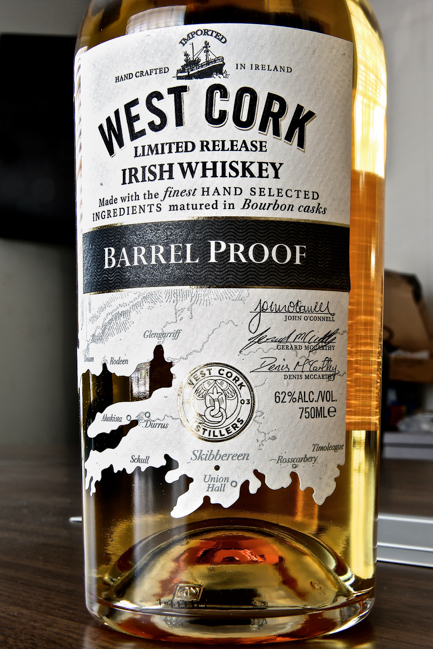The Tenets of Nationalism

What does a term like "Irish whiskey" mean beyond the technical and regulatory definitions? Does any whiskey made in Ireland that abides by the standards and practices of the category qualify, or is there something beyond that—something rooted in the national spirit? If it's merely the former, then—yes—whiskey made at the big three all constitute as "Irish whiskey"—and by the "big three," I mean Midleton, Bushmills, and Cooley. Located in the town of Midleton inside of County Cork, Midleton's whisky complex has been in the hands of the Irish Distillers company since 1966 when Jameson, Powers, and the Cork Distilleries Company merged to form the whiskey megapower. Jameson had been made in Dublin prior to that at the old John Jameson distillery originally established in 1780. Powers had also been centered in the Irish capital, but subsequently moved its operations to Cork, following suit. Since then both brands, as well as Paddy's, Redbreast, and Midleton Rare, have been made at Midleton. In 1988, however, Irish Distillers merged with Pernod-Ricard and continues to be owned by the French spirits giant based out of Paris.
The old Bushmills distillery dates back to 1784 in the eponymous village of Northern Ireland. Its spirit is sometimes referred to as "Protestant whisky" by the predominantly Catholic mainland. Bushmills, too, joined the Irish Distillers group in 1972 and fell into French hands after the Pernod-Ricard takeover in 1988, but the distillery was sold out of the portfolio in 2005 when Diageo made an offer for the brand. For nine years Bushmills was owned by the London-based corporation, but in 2014 Diageo traded the distillery to Jose Cuervo in exchange for full ownership of Don Julio. Today Bushmills remains in Northern Ireland, but it's owned by the Mexican Tequila conglomerate.
Cooley distillery is much younger than its older brothers. Founded in 1987 in County Louth by Irish businessman John Teeling, the site was formerly used to make potato-based alcohol. Converted into a whiskey distillery with the addition of proper whisky stills, within ten years Cooley was turning heads as an up-and-coming independent producer. Its core expressions—Tyrconnel, Kilbeggan, and Connemara—were being sought out by fans of the genre who were seeking something different, outside the normal scope of Jameson and Bushmills. In 2011, however, Teeling sold the distillery to Jim Beam, which as we know was purchased by Suntory in 2014. What was once the only Irish-owned distillery went quickly from American hands into Japanese stewardship.
That brings us to West Cork, the only Irish-owned Irish whiskey we sell at K&L and one of the best bang-for-your-buck products in the business. The West Cork distillery started as a pet project by John O’ Connell, Denis McCarthy and Ger McCarthy in 2003 in Union Hall, West Cork. In 2013 after much expansion WCD moved to a larger distillery in Skibbereen, West Cork where it now resides. Not only are they the only Irish-owned whiskey at K&L, they're also the only producer in Ireland to actually malt their own barley and use Irish spring water for the production process, resulting in a softer, more delicate spirit. They also only distill indigenously-grown Irish barley and wheat. Yet, somehow their prices are cheaper than the standard brands, despite the disproportionate cash investments and the supremely diminished size of scale. In a move reminiscent of the Warriors signing Jerry West as an advisor, West Cork snagged Frank McHardy last year, the former master distiller for Springbank who has a penchant for making great stuff. 2016 might be their real break out year, however, as the company just unleashed a 62% cask strength edition with plans for a double black, charred cask release later in the month.
I had a lady in the store yesterday who asked me for an Irish whiskey recommendation. She had no idea what Irish whiskey was or what made it different from Scotch whisky. "There's not that big of a difference," I told her with a laugh, "except that one is made in Ireland and the other is made in Scotland." She frowned. "But," I added, "Irish whiskey is typically lighter, softer, easier to drink and it rarely has peat or sherry-maturation, so it tends to taste rather similar unlike Scotch which can vary widely in its flavor profile." She perked back up. "Plus," I continued, "it tends to have more of a blue collar, working class, everyman reputation; you might typically get a shot and a beer down at the local pub while chatting with the boys after work."
"That sounds like my kind of whiskey," she said with a smile. I gave her a bottle of West Cork ten year old.
Why did I choose the West Cork? I'm not sure. Maybe because after thinking about my characterization of Irish whiskey my mind just unconsciously went with the Irish-owned distillery. Does the geographic location of ownership really matter in today's corporate-dominated environment? Is Four Roses any less American because it's owned by Kirin in Japan? Are Ardbeg and Bruichladdich less authentically Islay because they're owned by the French? I don't know. I think it depends on the drinker, but I know that there's a certain pride in a product being American made. Does it make a difference if that same product isn't American owned?
Whiskey that's made domestically, but owned by foreign investors. That's so often the case these days I'm not quite used to the anomaly: Irish-made, Irish-owned. It does have a nice ring to it.
-David Driscoll
